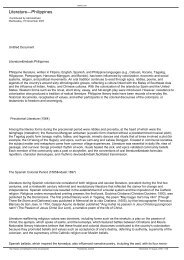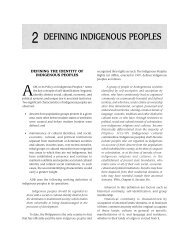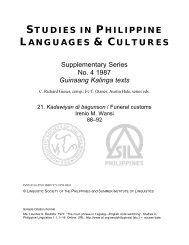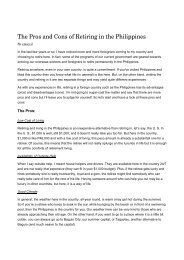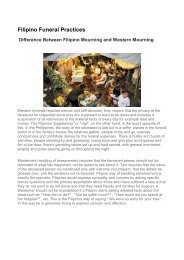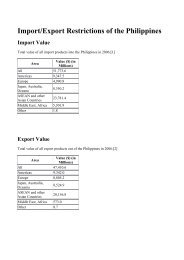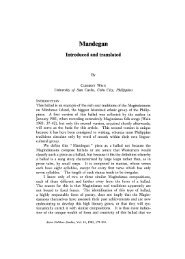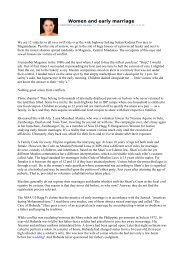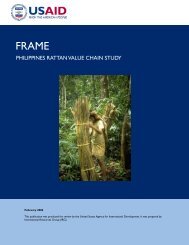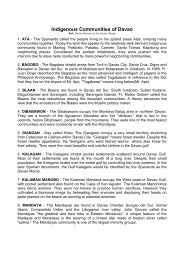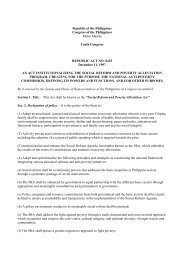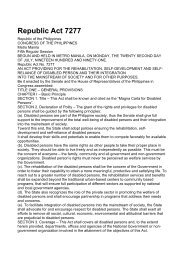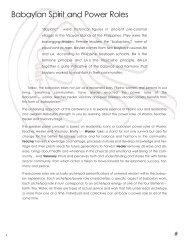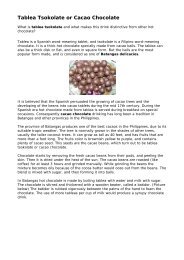Datu Puti ~ Philippine Legend - Philippine Culture
Datu Puti ~ Philippine Legend - Philippine Culture
Datu Puti ~ Philippine Legend - Philippine Culture
Create successful ePaper yourself
Turn your PDF publications into a flip-book with our unique Google optimized e-Paper software.
<strong>Datu</strong> <strong>Puti</strong> ~ <strong>Philippine</strong> <strong>Legend</strong><br />
I’m sorry I can’t remember whom, but someone mentioned in a comment the<br />
name <strong>Datu</strong> <strong>Puti</strong> from <strong>Philippine</strong> <strong>Legend</strong>. The name was new to me, as is<br />
<strong>Philippine</strong> legend and mythology in general, and so I thought I would see<br />
what I could unearth. What follows is virtually the sum of my knowledge,<br />
and was produced taking information from a number of sources, both<br />
historical and of legend. If I have it wrong, then perhaps someone could let<br />
me know.<br />
Historians tell us that that 10 Bornean datus headed by <strong>Datu</strong> <strong>Puti</strong>, along<br />
with their followers, fled Borneo to escape persecution by <strong>Datu</strong> Makatunaw,<br />
the rajah of the House of Sri-Vijaya. They boarded their long ships called<br />
barangays in order to seek out new lands.<br />
The other Dutus who accompanied <strong>Datu</strong> <strong>Puti</strong> were, <strong>Datu</strong> Sumakwel, <strong>Datu</strong><br />
Bangkaya, <strong>Datu</strong> Paiborong, <strong>Datu</strong> Paduhinogan, <strong>Datu</strong> Dumangsol, <strong>Datu</strong> Libay,<br />
<strong>Datu</strong> Dumangsil, <strong>Datu</strong> Domalogdog, and <strong>Datu</strong> Balensuela. Together they were<br />
to become the founders of the pre-colonial <strong>Philippine</strong> civilisation.<br />
They sailed the seas, until they came to two islands, Panay and Sinugbuhan,<br />
which were at that time under the rule of an Ati King, or Aeta "big-man,"<br />
named Marikudo. Those Marikudo ruled were pygmy-like bands that<br />
practised hunting and gathering as well as slash and burn farming (kaingin),<br />
and they were initially in terror of the Borneans. However, <strong>Datu</strong> <strong>Puti</strong>, sought<br />
a peaceful alliance and was therefore welcomed by the Aetas. Immediately,<br />
they forged trade relations with the natives exchanging their combs,<br />
hatchets, knives and copper swords (called kris) for the Aetas’ deer horns,<br />
boar teeth, bamboo baskets, and various maritime products.<br />
To commemorate the new alliance, Marikudo invited his new associates for a<br />
feast under the thick, broad branches of his dapdap and the bounteous food<br />
was laid on banana leaves. The Borneans came wearing splendid<br />
accoutrements. The men wore kerchiefs wound 4 times around their heads,
grandiose jewellery, sleeveless and collarless vests and various shirts. The<br />
women wore their hair parted in the middle and knotted in two, like horns of<br />
a cow’s calf, and perched on each ear. They had long sleeved blouses and<br />
they had long, ornately coloured skirts called tapis.<br />
At this feast, the <strong>Datu</strong>s negotiated the purchase of land for one gold sadok<br />
and a gold necklace for Marikudo’s wife, and since the Aetas thought that<br />
the island was too large to farm, they agreed. The Aetas, who preferred<br />
the cover of forests and mountains, retreated to such areas (where they<br />
can still be found today), while the <strong>Datu</strong>s divided the island into political<br />
units called saktop, namely Hantic (Antique), Aklan, and Irong-Irong (Iloilo),<br />
and thus founded the various clans of the <strong>Philippine</strong> culture. <strong>Datu</strong> <strong>Puti</strong>,<br />
Bangkaya, and Paiburong headed these saktops. The entire island continued<br />
to be called Hantic.<br />
After the <strong>Datu</strong>s were settled, <strong>Datu</strong> <strong>Puti</strong> proclaimed that he would sail back<br />
to Borneo to challenge the tyrant Makatunaw, and as he was the only one<br />
powerful enough, the other <strong>Datu</strong>s agreed. <strong>Datu</strong> <strong>Puti</strong>, his wife and servants<br />
set sail for Borneo and were never heard from again.<br />
<strong>Datu</strong> Sumakwel was appointed the new leader and under his leadership the<br />
culture prospered. He established a permanent settlement in what is now<br />
Malandog in the municipality of Hamtic. It was named for a species of a<br />
large ant called hantic-hantic, which abounds there.<br />
Ref.: http://waylandermyth.multiply.com/journal/item/21/<strong>Datu</strong>_<strong>Puti</strong>_<strong>Philippine</strong>_<strong>Legend</strong>



